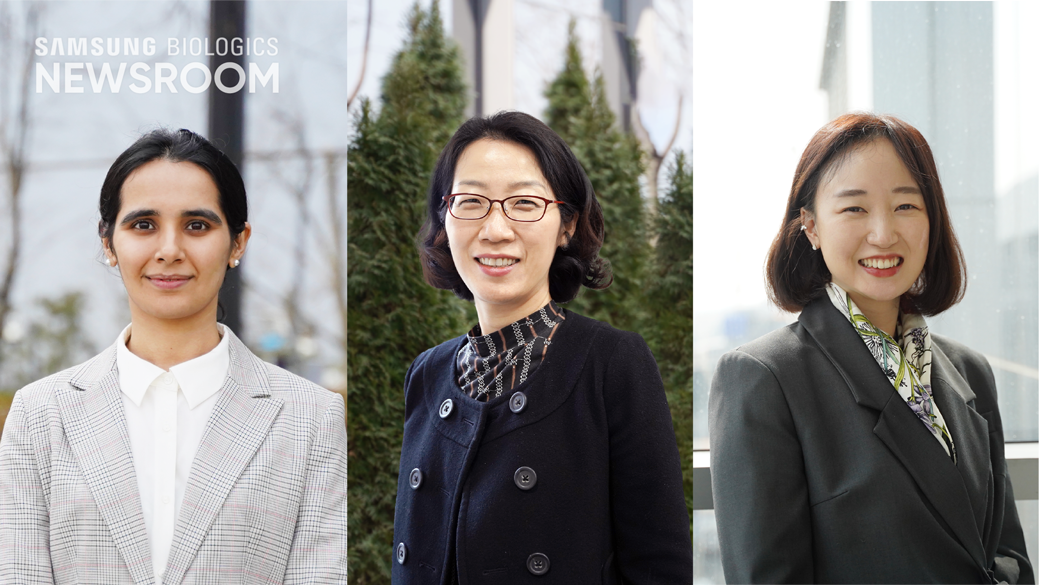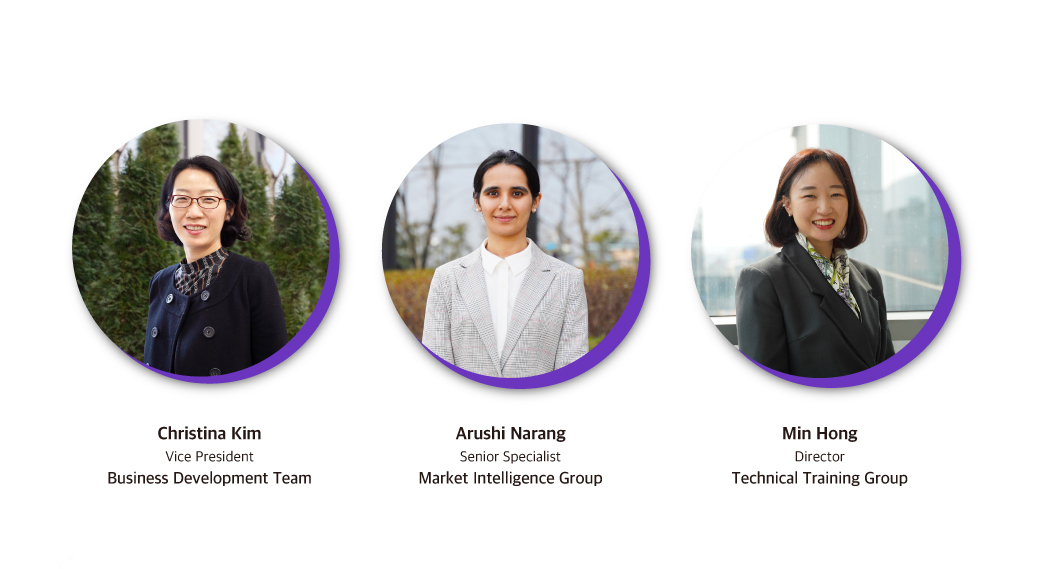Press Releases
Driven. For Equity. | Embrace equity for a better tomorrow

Respecting life, human dignity and equity are important values for society as a whole. This year, the campaign theme of International Women’s Day is #EmbraceEquity – highlighting that equality isn’t enough of a level playing field, and that there is a need to push for equity. While equality means that everyone is given the same opportunities, equity realizes that everyone has a different start and allocates resources and opportunities for an equal outcome. In this article, female leaders and colleagues at Samsung Biologics share their insight on what equity means to them and how they are supporting a positive change.

What does equity mean to you? Have you had a chance to think about equity in your life?
Christina Kim: Equity for me is acknowledging and embracing the value of what one individual can bring as who she or he is regardless of ethnic, social, educational background and their appearances. This applies to any setting including work, family, community, country, etc. You get the idea. I often think about my equity and how I can use it to voice and present different perspectives. More importantly, I try to see the same in others and close any gaps and biases I might have due to our differences. Our equity cannot be measured as low versus high, but as differences because we all are unique on our own.
Min Hong: When I was in charge of BWC (Bio Women's Club) in Samsung Biologics last year, I learned the difference between 'equality' and 'equity' by looking for data related to diversity, equality, and respect. "Equality" refers to equal access to resources and opportunities, but "equity" refers to receiving resources and opportunities according to different situations. I think "equality" in our society should go in the direction of "equity" as a result.
Arushi Narang: I interpret equity as the equality of opportunity to access (education, healthcare, earning to live life with dignity, etc.) for everyone. The bias is unconscious and ingrained. I try to work around the biases – especially when working in multicultural teams across geographies.
What do you think of social issues on equity (healthcare, gender, education, etc.)?
Arushi Narang: Our society pays a gigantic toll for the inequity. A McKinsey analysis showed that my native country India will lose $3 trillion in GDP in 2025 due to gender inequity. There's no calculating the toll of other injustices - based on religion, disabilities, race, sexual orientation. Continuous efforts are being made to promote the value of diversity, but inequity still exists throughout society. In particular, ‘equity’ and ‘equality’ are words that can be interpreted in a different way so I think it is crucial to come to a social consensus.
Min Hong: Compared to the past, more people nowadays sympathize social imbalances and try to solve the problem. However, as these issues are difficult to solve individually, society as a whole needs to embrace different colors and move away from black and white thinking.
Christina Kim: We also need to ask ourselves if we have been using the same society-set “equity” standards to ourselves and those around us. In the earlier part of my career, I tried very hard to be “equal match” to all other white, male, older colleagues at work. Sooner or later, I realized, the more I strived to be the same, the more frustrated I got. I started to present what I considered as disadvantages (women, youngest leadership member, and Asian-American) as strengths. It is liberating to be who you are and I believe that it is the only pathway to reach your optimal potential.
What can we do to make 'fair society' or 'equal society'?
Arushi Narang: My team at Samsung Biologics recently explored ways to make healthcare more equitable globally. It's a tremendous opportunity for humanity. Just using known interventions at realistic rates in developing economies could generate $2-4 for every $1 investment, according to public research by Brookings Institution. I believe that my work at Samsung Biologics can contribute to increasing access to healthcare.
Min Hong: We can make change by speaking against injustice and discrimination. It’s the same at work, we should assign tasks and give opportunities considering the various skill sets of each employee to realize their full potential.
Christina Kim: Closing the gap starts with me and you. We must value ourselves first! Know what your unique differences are, and then convey the message you want. This means, you must be willing to provide the exact same opportunities to others, acknowledging and embracing their differences.
Releated Contents
Life @ Samsung Biologics 2022 International Women’s Day | Breaking The Bias

Respecting life, human dignity and equity are important values for society as a whole. This year, the campaign theme of International Women’s Day is #EmbraceEquity – highlighting that equality isn’t enough of a level playing field, and that there is a need to push for equity. While equality means that everyone is given the same opportunities, equity realizes that everyone has a different start and allocates resources and opportunities for an equal outcome. In this article, female leaders and colleagues at Samsung Biologics share their insight on what equity means to them and how they are supporting a positive change.

What does equity mean to you? Have you had a chance to think about equity in your life?
Christina Kim: Equity for me is acknowledging and embracing the value of what one individual can bring as who she or he is regardless of ethnic, social, educational background and their appearances. This applies to any setting including work, family, community, country, etc. You get the idea. I often think about my equity and how I can use it to voice and present different perspectives. More importantly, I try to see the same in others and close any gaps and biases I might have due to our differences. Our equity cannot be measured as low versus high, but as differences because we all are unique on our own.
Min Hong: When I was in charge of BWC (Bio Women's Club) in Samsung Biologics last year, I learned the difference between 'equality' and 'equity' by looking for data related to diversity, equality, and respect. "Equality" refers to equal access to resources and opportunities, but "equity" refers to receiving resources and opportunities according to different situations. I think "equality" in our society should go in the direction of "equity" as a result.
Arushi Narang: I interpret equity as the equality of opportunity to access (education, healthcare, earning to live life with dignity, etc.) for everyone. The bias is unconscious and ingrained. I try to work around the biases – especially when working in multicultural teams across geographies.
What do you think of social issues on equity (healthcare, gender, education, etc.)?
Arushi Narang: Our society pays a gigantic toll for the inequity. A McKinsey analysis showed that my native country India will lose $3 trillion in GDP in 2025 due to gender inequity. There's no calculating the toll of other injustices - based on religion, disabilities, race, sexual orientation. Continuous efforts are being made to promote the value of diversity, but inequity still exists throughout society. In particular, ‘equity’ and ‘equality’ are words that can be interpreted in a different way so I think it is crucial to come to a social consensus.
Min Hong: Compared to the past, more people nowadays sympathize social imbalances and try to solve the problem. However, as these issues are difficult to solve individually, society as a whole needs to embrace different colors and move away from black and white thinking.
Christina Kim: We also need to ask ourselves if we have been using the same society-set “equity” standards to ourselves and those around us. In the earlier part of my career, I tried very hard to be “equal match” to all other white, male, older colleagues at work. Sooner or later, I realized, the more I strived to be the same, the more frustrated I got. I started to present what I considered as disadvantages (women, youngest leadership member, and Asian-American) as strengths. It is liberating to be who you are and I believe that it is the only pathway to reach your optimal potential.
What can we do to make 'fair society' or 'equal society'?
Arushi Narang: My team at Samsung Biologics recently explored ways to make healthcare more equitable globally. It's a tremendous opportunity for humanity. Just using known interventions at realistic rates in developing economies could generate $2-4 for every $1 investment, according to public research by Brookings Institution. I believe that my work at Samsung Biologics can contribute to increasing access to healthcare.
Min Hong: We can make change by speaking against injustice and discrimination. It’s the same at work, we should assign tasks and give opportunities considering the various skill sets of each employee to realize their full potential.
Christina Kim: Closing the gap starts with me and you. We must value ourselves first! Know what your unique differences are, and then convey the message you want. This means, you must be willing to provide the exact same opportunities to others, acknowledging and embracing their differences.
Releated Contents
Life @ Samsung Biologics 2022 International Women’s Day | Breaking The Bias